| Season Start: | 28 December 1974 | | Season End: | 10 May 1975 | | Season Length: | 20 Weeks | | Writers: | Bob Baker, Dave Martin, Gerry Davis, John Lucarotti, Robert Holmes, Terrance Dicks and Terry Nation | | Directors: | Christopher Barry, David Maloney, Michael Briant and Rodney Bennett | | Producers: | Barry Letts and Philip Hinchcliffe | | Script Editor: | Robert Holmes | | Visual Effects: | Clifford Culley, Jim Ward, John Friedlander, Peter Day and Tony Oxley | | Title Sequence: | Bernard Lodge | | Title Music: | Ron Grainer and the BBC Radiophonic Workshop. Arranged by Delia Derbyshire |
|
Incarnation of the Doctor: |
The Fourth Doctor (Newly Regenerated)
|
| Number of
Companions: |
4 |
| The
Companions: |
The Brigadier, Sergeant Benton, Sarah Jane Smith and Harry Sullivan (Joins)
|
| Number of
Stories: |
5
|
| Number of
Incomplete/Missing Stories: |
0
|
| Number of
Episodes: |
20
|
| Number of
Incomplete/Missing Episodes: |
0
|
| Percentages: |
| Full Stories Held | 100% | | Episodes Held | 100% |
|
| Doctor Who Magazine Poll (1998) | | | Doctor Who Magazine Poll (2009) | | | Doctor Who Magazine Poll (2014) | |
|
 'To hold in my hand, a capsule that contained such power. To know that life and death on such a scale was my choice. To know that the tiny pressure on my thumb, enough to break the glass, would end everything. Yes. I would do it. That power would set me up above the gods. And through the Daleks I shall have that power!' 'To hold in my hand, a capsule that contained such power. To know that life and death on such a scale was my choice. To know that the tiny pressure on my thumb, enough to break the glass, would end everything. Yes. I would do it. That power would set me up above the gods. And through the Daleks I shall have that power!'
Davros
(Genesis of the Daleks) |
|
|
|
|
| |
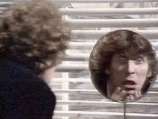 |
| A New Face |
|
 One of the most important things about Season Twelve is the fact that it quickly establishes Tom Baker as the Fourth Doctor with his memorable performance in "Robot". But it is not just in this first story as it doesn't let up until the end of the season thanks to the quality of the stories and the combination of The Doctor, Sarah Jane Smith and new companion Harry Sullivan. One of the most important things about Season Twelve is the fact that it quickly establishes Tom Baker as the Fourth Doctor with his memorable performance in "Robot". But it is not just in this first story as it doesn't let up until the end of the season thanks to the quality of the stories and the combination of The Doctor, Sarah Jane Smith and new companion Harry Sullivan.
 This season was originally planned to contain twenty six episodes but was cut short by a change in start date for the following season. Therefore at only twenty episodes this was the shortest season so far in the shows history. Despite this it is still managed to contain a lot of well admired elements - namely Tom Baker's introduction and of course "Genesis of the Daleks" - the classic story that revealed, for the first time on television, the creation of the Daleks and which introduced Davros - proving that the BBC were still able to achieve big successes, due in no small part to the phenomenal impact still made by the Daleks. This season was originally planned to contain twenty six episodes but was cut short by a change in start date for the following season. Therefore at only twenty episodes this was the shortest season so far in the shows history. Despite this it is still managed to contain a lot of well admired elements - namely Tom Baker's introduction and of course "Genesis of the Daleks" - the classic story that revealed, for the first time on television, the creation of the Daleks and which introduced Davros - proving that the BBC were still able to achieve big successes, due in no small part to the phenomenal impact still made by the Daleks.
 As this season progressed it was clear that Doctor Who was moving further away from the Earth bound stories which had sustained the show during the Third Doctor's era. This of course meant a move away from the much liked UNIT stories that were the main-stay of the Third Doctor’s era. As this season progressed it was clear that Doctor Who was moving further away from the Earth bound stories which had sustained the show during the Third Doctor's era. This of course meant a move away from the much liked UNIT stories that were the main-stay of the Third Doctor’s era.
 The stories in this season, despite containing traditional elements and the return of some well known villains (including the Sontarans, the Daleks and the Cybermen) were starting to give an indication that the show was undergoing a significant change of style under the new production team of Robert Holmes (replacing Terrance Dicks as Script Editor) and Philip Hinchcliffe (replacing Barry Letts as Producer). The stories in this season, despite containing traditional elements and the return of some well known villains (including the Sontarans, the Daleks and the Cybermen) were starting to give an indication that the show was undergoing a significant change of style under the new production team of Robert Holmes (replacing Terrance Dicks as Script Editor) and Philip Hinchcliffe (replacing Barry Letts as Producer).
 Barry Letts had been producer of the show for five years – helming every story from "Doctor Who and the Silurians" until "Robot". Despite "Robot" being his last credited involvement in the show as Producer, Barry Letts continued to supervise Philip Hinchcliffe for the next two stories - these being "The Ark in Space" and "The Sontaran Experiment". Barry Letts had been producer of the show for five years – helming every story from "Doctor Who and the Silurians" until "Robot". Despite "Robot" being his last credited involvement in the show as Producer, Barry Letts continued to supervise Philip Hinchcliffe for the next two stories - these being "The Ark in Space" and "The Sontaran Experiment".
 One of the unique features of this season is the fact that the stories continue on from each other, and this was something that hadn't really been seen during the Jon Pertwee years. As there is a progression through each of the stories following "Robot" continuing through to "Terror of the Zygons" helps to ensure that there was something extra special about this season. One of the unique features of this season is the fact that the stories continue on from each other, and this was something that hadn't really been seen during the Jon Pertwee years. As there is a progression through each of the stories following "Robot" continuing through to "Terror of the Zygons" helps to ensure that there was something extra special about this season.
 Both "The Ark in Space" and "Genesis of the Daleks" are the standout stories in a season of consistent quality. Also, apart from "Robot", the stories possessed much more realistic and horrific qualities with themes based on warfare, racial hatred and genetic experiment being explored much deeper than in the past. This was only the start of a trend which would be continued into Season Thirteen. Both "The Ark in Space" and "Genesis of the Daleks" are the standout stories in a season of consistent quality. Also, apart from "Robot", the stories possessed much more realistic and horrific qualities with themes based on warfare, racial hatred and genetic experiment being explored much deeper than in the past. This was only the start of a trend which would be continued into Season Thirteen.
 It was early days for Philip Hinchcliffe at the helm. But already he was making his mark on the show. He believed that in order to expand the show's core audience, it was necessary to broaden the show's appeal to adults. This though had a knock on effect with both "The Sontaran Experiment" and "Genesis of the Daleks" generating considerable outcries about the level of violence portrayed. Mary Whitehouse's National Viewers' and Listeners' Association even complained that the Dalek story contained ‘tea-time brutality for tots’. Despite this the viewing figures for this season were high (an average of 10 million viewers) with the highest viewed story being "The Ark in Space" with 11.1 million viewers (13.6 million viewers watched the second episode – making it one of the most watched episodes). This helped make Season Twelve one of the best in Tom Baker's time as The Doctor and must go down as one of the best in the history of Doctor Who. It was early days for Philip Hinchcliffe at the helm. But already he was making his mark on the show. He believed that in order to expand the show's core audience, it was necessary to broaden the show's appeal to adults. This though had a knock on effect with both "The Sontaran Experiment" and "Genesis of the Daleks" generating considerable outcries about the level of violence portrayed. Mary Whitehouse's National Viewers' and Listeners' Association even complained that the Dalek story contained ‘tea-time brutality for tots’. Despite this the viewing figures for this season were high (an average of 10 million viewers) with the highest viewed story being "The Ark in Space" with 11.1 million viewers (13.6 million viewers watched the second episode – making it one of the most watched episodes). This helped make Season Twelve one of the best in Tom Baker's time as The Doctor and must go down as one of the best in the history of Doctor Who.
 Any fears that the public might react badly to Tom Baker's new Doctor, following Jon Pertwee's five-year tenure, were quickly allayed. With the second episode of "The Ark in Space" obtaining the highest chart position ever achieved, in the original run of the show, this was just the first sign of the incredible success Tom Baker would bring to the show. Any fears that the public might react badly to Tom Baker's new Doctor, following Jon Pertwee's five-year tenure, were quickly allayed. With the second episode of "The Ark in Space" obtaining the highest chart position ever achieved, in the original run of the show, this was just the first sign of the incredible success Tom Baker would bring to the show.
 The millions of viewers at the time who tuned in could scarcely have realised that they were witnessing the start of the transformation of Doctor Who from British television stalwart to worldwide cult phenomenon... The millions of viewers at the time who tuned in could scarcely have realised that they were witnessing the start of the transformation of Doctor Who from British television stalwart to worldwide cult phenomenon...
|
|
|
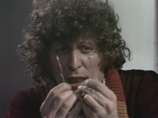 |
| Can The Doctor Destroy the Birth of the Daleks? |
|
 The first story, "Robot", contains the introduction of the Fourth Doctor. Tom Baker quickly establishes himself as The Doctor with ease and his performance during this story, and especially the first episode, is well executed. Of special note is his confrontation with Harry Sullivan when he is trying to convince the UNIT's medical officer that he is The Doctor when he states: ‘You may be a doctor. But I'm The Doctor. The definite article, you might say’. The first story, "Robot", contains the introduction of the Fourth Doctor. Tom Baker quickly establishes himself as The Doctor with ease and his performance during this story, and especially the first episode, is well executed. Of special note is his confrontation with Harry Sullivan when he is trying to convince the UNIT's medical officer that he is The Doctor when he states: ‘You may be a doctor. But I'm The Doctor. The definite article, you might say’.
 Another must see story is "Genesis of the Daleks". This story has the scene where The Doctor has a dilemma between his duty to the Time Lords and his own conscience about destroying the whole Dalek race at it’s out-set. Another must see story is "Genesis of the Daleks". This story has the scene where The Doctor has a dilemma between his duty to the Time Lords and his own conscience about destroying the whole Dalek race at it’s out-set.
 The Doctor finally had the opportunity to destroy the embryonic creatures which will become the Daleks. All he had to do was to touch two wires together. But this simple operation thwarts him as he battles with his conscience telling Sarah Jane Smith 'Do I have the right? Simply touch one wire against the other and that's it. The Daleks cease to exist. Hundreds of millions of people, thousands of generations can live together without fear… But if I kill. Wipe out a whole intelligent life form, then I become like them. I'd be no better than the Daleks'. But even as Sarah tries to persuade him to carry out his duty for the Time Lords you can really see, and feel, The Doctor's anguish. The Doctor finally had the opportunity to destroy the embryonic creatures which will become the Daleks. All he had to do was to touch two wires together. But this simple operation thwarts him as he battles with his conscience telling Sarah Jane Smith 'Do I have the right? Simply touch one wire against the other and that's it. The Daleks cease to exist. Hundreds of millions of people, thousands of generations can live together without fear… But if I kill. Wipe out a whole intelligent life form, then I become like them. I'd be no better than the Daleks'. But even as Sarah tries to persuade him to carry out his duty for the Time Lords you can really see, and feel, The Doctor's anguish.
 This may be the classic scene of this story but "Genesis of the Daleks" contains many other elements which has made it one, if not the most popular Doctor Who story in the whole of the series’ history. As well as revealing for the first time on television the creation of the Daleks this story introduced Davros – the mad Kaled scientist who created the Daleks so that the Kaled race could survive after years of chemical and radiation weapons being used in their war against the Thals. So popular was the character of Davros that he would subsequently appear in all the following Dalek stories of the original series. But this, his first, story must be considered as being his best. This may be the classic scene of this story but "Genesis of the Daleks" contains many other elements which has made it one, if not the most popular Doctor Who story in the whole of the series’ history. As well as revealing for the first time on television the creation of the Daleks this story introduced Davros – the mad Kaled scientist who created the Daleks so that the Kaled race could survive after years of chemical and radiation weapons being used in their war against the Thals. So popular was the character of Davros that he would subsequently appear in all the following Dalek stories of the original series. But this, his first, story must be considered as being his best.
 Also in this story listen out for the classic discussion between The Doctor and Davros about the use of a hypothetical viral weapon which resulted in the famous line spoken by Davros: Also in this story listen out for the classic discussion between The Doctor and Davros about the use of a hypothetical viral weapon which resulted in the famous line spoken by Davros:
‘Yes. Yes. To hold in my hand a capsule that contained such power. To know that life and death on such a scale was my choice. To know that the tiny pressure of my thumb, enough to break the glass, would end everything. Yes. I would do it. That power would set me up above the gods. And through the Daleks, I shall have that power!’.
|
|
|
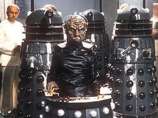 |
| Davros and His Daleks |
|
 The highest point must go to "Genesis of the Daleks". Voted the most popular Doctor Who story ever by readers of the Doctor Who Magazine it has achieved a state of near perfection in it's perception. This story is easily the best Season Twelve story with some truly chilling moments such as the first appearance of Davros, brilliantly played by the late Michael Wisher, and an excellent performance from Peter Miles as Nyder. It's a brilliantly epic story which has some great Doctor Who moments, such as the scene whether The Doctor has the right to destroy the Daleks or not, and provides six episodes of solid, gripping entertainment. The highest point must go to "Genesis of the Daleks". Voted the most popular Doctor Who story ever by readers of the Doctor Who Magazine it has achieved a state of near perfection in it's perception. This story is easily the best Season Twelve story with some truly chilling moments such as the first appearance of Davros, brilliantly played by the late Michael Wisher, and an excellent performance from Peter Miles as Nyder. It's a brilliantly epic story which has some great Doctor Who moments, such as the scene whether The Doctor has the right to destroy the Daleks or not, and provides six episodes of solid, gripping entertainment.
 The lowest point is "Revenge of the Cybermen". This story unfortunately finishes the season off in rather uncertain style. When compared to the quality of the others within this season it is a little disappointing. The scenes set on Voga especially so with the Vogans being poorly realised. The story is entertaining enough in parts but it suffers from a weak script and some poor special effects – namely the out-of-control beacon flying over the surface of the asteroid which, unfortunately, is obviously a spinning cylinder of lunar surface. Despite being the first Cyberman story in colour it is a shame that "Revenge of the Cybermen" did not deliver more. Even with another re-design of the Cybermen’s costumes their re-introduction to the show (after an absence of 6 years) was wasted. The biggest disappointment is the fact that this is the only Fourth Doctor story to feature the Cybermen and it was their last appearance (barring flashbacks) for seven years until the 1982 Fifth Doctor story "Earthshock". The lowest point is "Revenge of the Cybermen". This story unfortunately finishes the season off in rather uncertain style. When compared to the quality of the others within this season it is a little disappointing. The scenes set on Voga especially so with the Vogans being poorly realised. The story is entertaining enough in parts but it suffers from a weak script and some poor special effects – namely the out-of-control beacon flying over the surface of the asteroid which, unfortunately, is obviously a spinning cylinder of lunar surface. Despite being the first Cyberman story in colour it is a shame that "Revenge of the Cybermen" did not deliver more. Even with another re-design of the Cybermen’s costumes their re-introduction to the show (after an absence of 6 years) was wasted. The biggest disappointment is the fact that this is the only Fourth Doctor story to feature the Cybermen and it was their last appearance (barring flashbacks) for seven years until the 1982 Fifth Doctor story "Earthshock".
 Having said that "Revenge of the Cybermen" may have received the least number viewers and have received the lowest number of votes in two Doctor Who Magazine ‘best story’ polls, for any story in this season, but it was still watched by a respectable 9 million viewers and was also chosen, by the BBC, to launch their highly successful range of stories released on videocassette to the public that continues to this day with stories being released on DVD and blue-ray. Having said that "Revenge of the Cybermen" may have received the least number viewers and have received the lowest number of votes in two Doctor Who Magazine ‘best story’ polls, for any story in this season, but it was still watched by a respectable 9 million viewers and was also chosen, by the BBC, to launch their highly successful range of stories released on videocassette to the public that continues to this day with stories being released on DVD and blue-ray.
|
|
|
|
|
| |
The Firsts:
 Tom Baker's first credited appearance as the Fourth Doctor. (Robot) Tom Baker's first credited appearance as the Fourth Doctor. (Robot)
 The introduction of new companion Harry Sullivan played by Ian Marter. (Robot) The introduction of new companion Harry Sullivan played by Ian Marter. (Robot)
 Robert Holmes' first credited involvement in the show as Script Editor. (Robot) Robert Holmes' first credited involvement in the show as Script Editor. (Robot)
 Philip Hinchcliffe's first involvement in the show as Producer. (The Ark in Space) Philip Hinchcliffe's first involvement in the show as Producer. (The Ark in Space)
 The first Doctor Who story to be watched by more than 13 million viewers. (The Ark in Space) The first Doctor Who story to be watched by more than 13 million viewers. (The Ark in Space)
 The first time in a story that no part of the TARDIS appears. (The Sontaran Experiment) The first time in a story that no part of the TARDIS appears. (The Sontaran Experiment)
 The first appearance of Davros. (Genesis of the Daleks) The first appearance of Davros. (Genesis of the Daleks)
 The first appearance of the Cybermen for 6 years - since the 1968 Second Doctor story "The Invasion". (Revenge of the Cybermen) The first appearance of the Cybermen for 6 years - since the 1968 Second Doctor story "The Invasion". (Revenge of the Cybermen)
 The first (and only) Fourth Doctor story to feature the Cybermen. (Revenge of the Cybermen) The first (and only) Fourth Doctor story to feature the Cybermen. (Revenge of the Cybermen)
|
| |
The Lasts (Subject to Future Stories):
| |
| Doctor Who CMS Magazine (In Vision) | Issue 6: Season 12 Overview - (Released: July 1988) | | Doctor Who Magazine - Episode Guide | Issue 148 - (Released: May 1989) | | Doctor Who Magazine - Article | Issue 290 - (Released: May 2000) | | Doctor Who Magazine - Countdown to 50 | Issue 441 - (Released: December 2011) |
|
|
| |
The Doctor and Companions| | 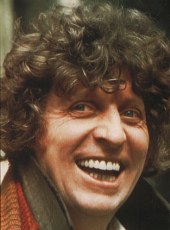 | | The Fourth Doctor |
|
| | | | |
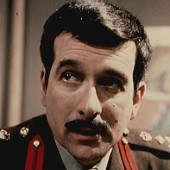 | | The Brigadier |
| 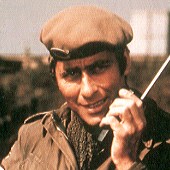 | | Sergeant Benton |
|  | | Sarah Jane Smith |
| | | | |  | | Harry Sullivan |
|
|
On Release | | The Collection Season 12 Limited Edition Blu-Ray Cover |

VIDEO |
| | 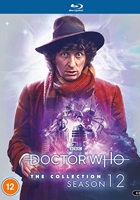 | | The Collection Season 12 Standard Edition Blu-Ray Cover |

VIDEO |
| | | | |
In Print| | 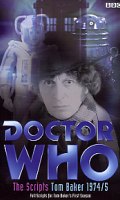 | | BBC Script Book Cover |

SCRIPT |
| | | | | |
Magazines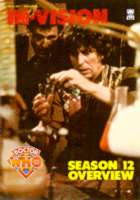 | | Doctor Who CMS Magazine (In Vision): Issue 6: Season 12 Overview |
| 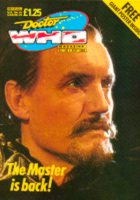 | | Doctor Who Magazine - Episode Guide: Issue 148 |
|  | | Doctor Who Magazine - Article: Issue 290 |
|  | | Doctor Who Magazine - Countdown to 50: Issue 441 |
| | | | |
|
|
|
| |
| |
|
| |
| |
|
| Doctor Who is the copyright of the British Broadcasting
Corporation. No infringements intended. This site is not endorsed by the BBC or
any representatives thereof. |
|